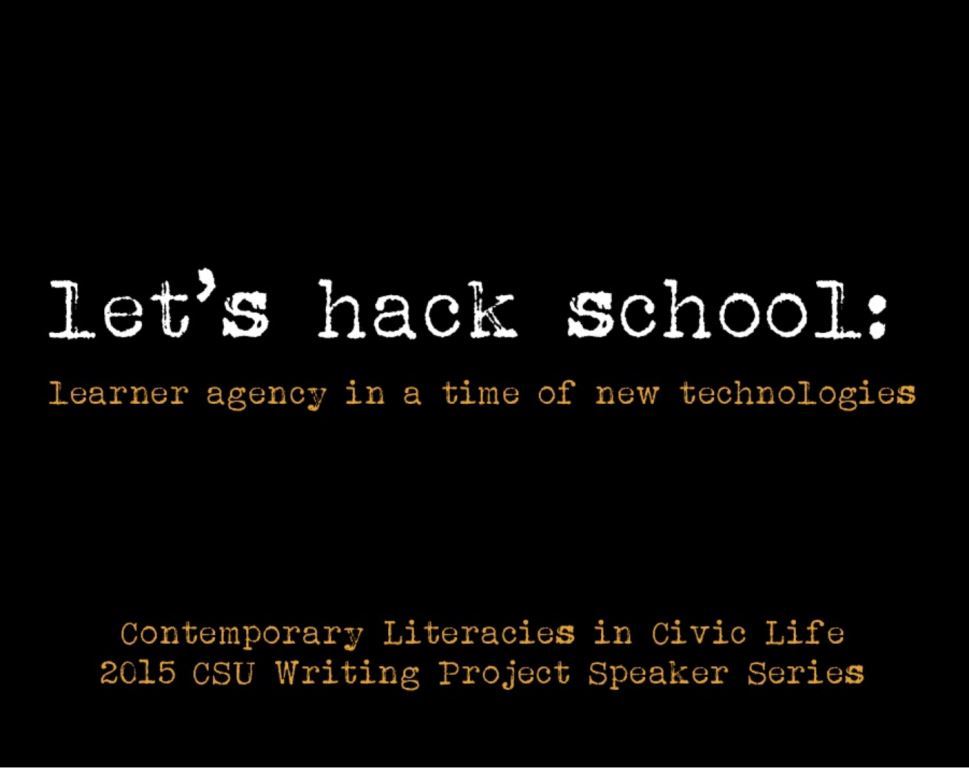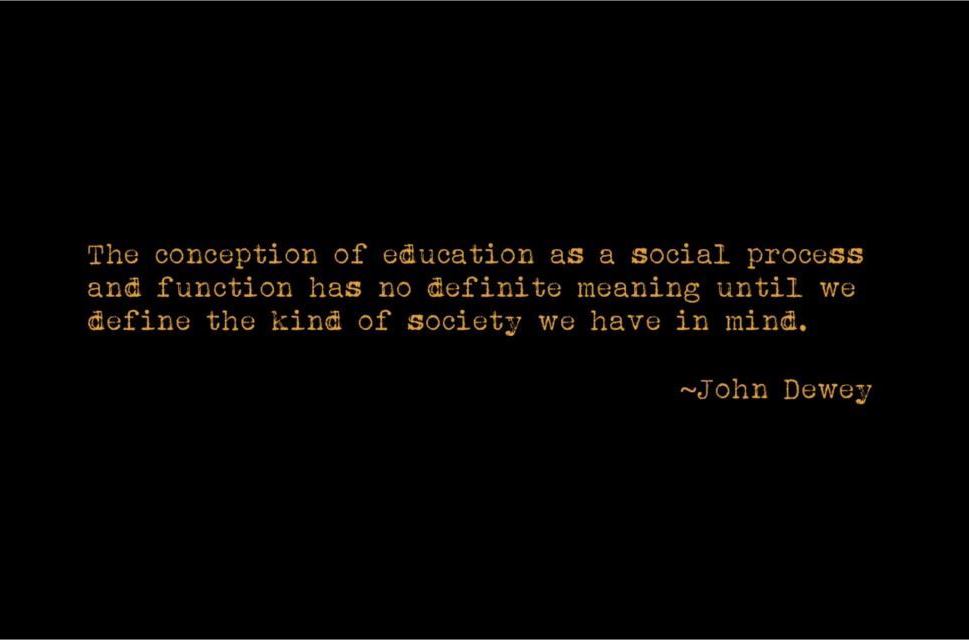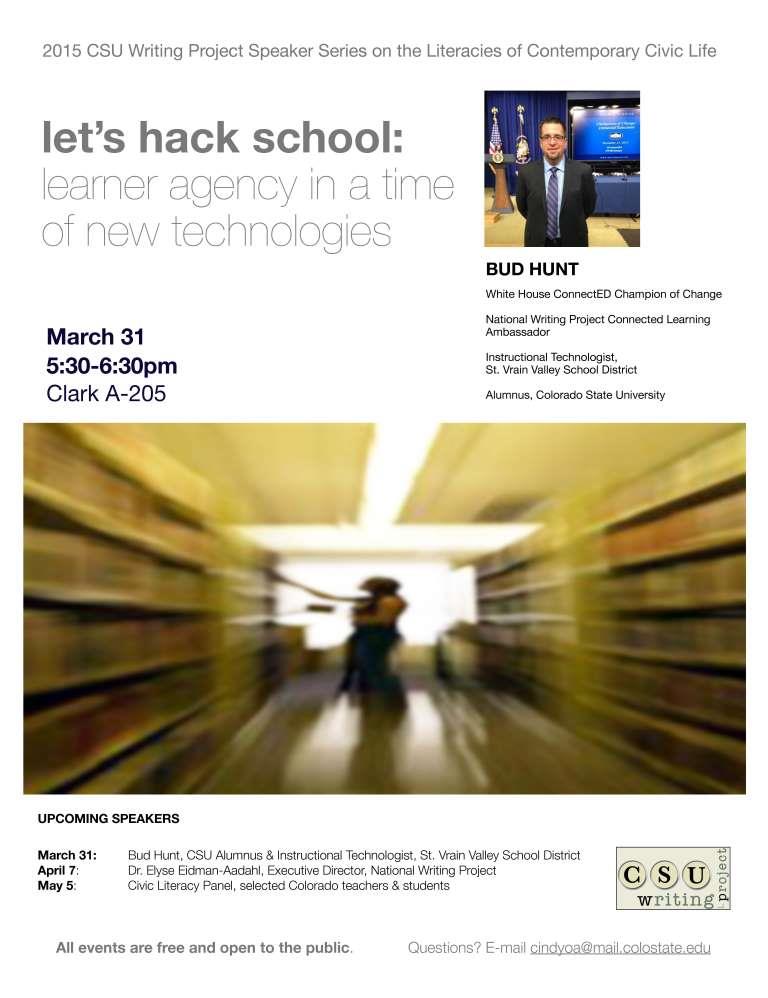On March 31st, Bud Hunt was the featured speaker at the most recent session of the CSU Writing Project Speaker Series on the Literacies of Contemporary Civic Life. On his blog, Hunt said, “Earlier this week, I had the honor of giving a talk in the CSU Literacies of Contemporary Civic Life speaker series. With my time … I talked about some of our work around professional learning and agency, as well as some of my thinking on the essential actions/literacies/habits that should be in our schools. I probably tried to cram too much into a fast talk, but I think it got some thinking going, which was my goal in the first place.”
English Department Communications Intern Marina Miller attended this session of the CSU Writing Project Speaker Series on the Literacies of Contemporary Civic Life and has this to share:
As soon as I heard Bud Hunt say tl;dr, I knew I was in for a technology filled presentation. After he explained to his audience that tl;dr stands for “too long, didn’t read,” I decided that he was probably attuned with young people in schools today, at least in terms of technological advances. I thought that maybe this could be a presentation that I could relate to.
He gave us the main topics for his presentation using six words: make, hack, play, platform, interface, and agency. Then I started to think, “Okay, those seem simple enough, I wonder what else is in store.”
Like all speaker series talks sponsored by the CSU Writing Project, we were asked to write down our answers to the following prompt: “What kind of society do you have in mind? What kind of school do you have in mind?”
Two English education students who sat in front of me turned around and invited me to discuss with them. One student said, “I’m not sure what kind of society I have in mind but my ideal school would be respectful, responsible, harmonious and accessible to everyone.” I told her that even though she didn’t know what kind of society she wanted to live in, what she described as the ideal school could also be seen as the ideal society.
Bud Hunt then said something along the lines of if you’re not out to improve the education system, then get out of the way for those who are. This led to the discussion of the current system and the attempts (or lack thereof) to improve the system. He told us that $8.38 billion has been spent on educational technology products in America. The goal of these ventures are generally to provide students with unique opportunities and to help them “direct their own learning.” It is his belief however, that most of the tools that are being used to implement these goals and shape schools are not actually providing unique opportunities for students, but rather just giving students the same activities and the same learning, and doing so in way that students don’t know that it is the same.
This issue was used to describe the word “agency.” He said that teachers should question why they’re doing the things that they’re told to do in order to have a sense of agency in their classrooms. In his experience, many teachers are just waiting to be told what to do in their own classrooms. We were then asked to discuss why we believed this was the case.
The same education student said that it was really frustrating to hear that, given her teaching philosophy. She said, “I understand that maybe when you’re first starting out, you need a little bit of guidance, but I don’t understand why you wouldn’t have agency once you’re beyond that.” We talked about the possibility of fear. People who push the boundaries often get cast aside and even punished in some cases. I also mentioned that it may be overwhelming to some who see the flaws in the system and want to change it but don’t necessarily know where to start.
The idea of change was next on the agenda. Hunt’s definition of “hack” was one that I really liked and had never thought about before his presentation. He said the “old school definition” of to hack was “to improve a system or program. For example, emoticons were supposed to be seen as a hack to traditional language.” It made me want to be a hacker of the systems that I have problems with.
The next few keywords were interrelated. Hunt said that we need to see classrooms as platforms. Platforms are the environment in which something happens, and it is important that we take into account the constraints and the facilities we may be working with within that platform. He defined “interface” as a system that exchanges information between other systems. In his analogy, the classroom is an interface between history and our current learning spaces. He urged the audience to redesign those spaces and reminded them that you can’t hack something that you don’t understand.
His suggestion to better understand the systems that you are involved in is to play, the last of his keywords. His definition of play also was not the traditional way of viewing play. Instead, Hunt defined play as “the ability to find freedom within constraints.” He explained that we need to dive in, be curious, explore, and most importantly have agency.
He concluded the talk with these thought provoking questions: “What are the reasons we can’t? How do we get around them? How are you going to make your school better?” These questions seemed to really pump up the audience and make everybody wonder, “What can I do to make systems better? How can I be a hacker if I dislike something?”
The session was recorded, so even if you had to miss it, you can watch it here. (The talk starts at nine minutes into the recording).
Bud Hunt also shared the slides from his presentation in his blog post, “Let’s Hack School: A Recent Talk at CSU.”
More about this series: Throughout the spring semester we’ll be hosting nationally recognized literacies-based researchers and educators to discuss how literacy and youth civic participation intersect from varying, interdisciplinary perspectives. The speakers will be presenting their work and engaging in dialogue from 5:30-6:30, followed by a brief reception. These events are free and open to the public. All of the speakers will be presenting at the CSU campus in Clark A 205.
Up next: The final session in the series is Tuesday, May 5th. This session will be a Civic Literacy Panel made up of Colorado teachers and students.


